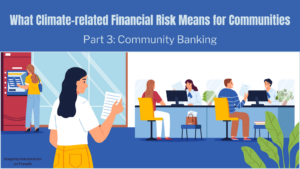
What Climate-related Financial Risk Means for Communities: Part 3 – Community Banking
Climate change-driven events—like heat waves, droughts, floods, and fires—cause damage to communities’ and individuals’ health and safety. But these events also threaten the financial well-being of communities across the U.S. through their impact on markets and local economies. These risks are increasingly visible in the housing and mortgage markets.
In this three-part series, we’ll be breaking down how the climate crisis is creating risk for three key financial systems—and how these risks to the insurance system, the real estate market, and community banking can affect communities.
Part 3: Climate-related Risks to Community Banking and Credit Unions
Climate change poses risks to individual banks as well as the entire banking system by damaging banking infrastructure, destroying collateral, and causing borrowers to default on loans. Threats to banks, especially to smaller banks, translate to risks to communities and individual households. Small banks serve local economies, engaging in relationship banking with small businesses and individuals. Some smaller banks also provide higher interest rates for deposits, more favorable loans than larger banks, and “better overall economic performance for their communities.”
Impacts on Communities
When climate disaster strikes a small geographic area, local banks may encounter difficulties in providing these tailored services to their communities, leaving households and individuals without vital resources.
For example, when Hurricane Sandy hit New York, local credit unions lost power and were unable to credit direct deposit checks to members’ accounts, answer customers’ phone calls, or provide online banking or ATM services. These issues lasted nearly a week and “affected more than 14,000 members, including many who complained that they had no access to cash to get through the storm’s aftermath or enough money in their accounts to pay bills.” Without timely access to banking services, the impacts of a crisis become even more dire, as people are left without the means to access food, shelter, and transportation. This example clearly shows how crucial it is to protect the banking system from the risks posed by climate change. In addition to operational risks like these, banks and credit unions may also face credit, market, and other financial risks, as climate-related impacts affect borrowers’ ability to repay loans and the value of investments.
How regulators are responding to climate-related risks to community banking
Three U.S. banking regulators – the Office of the Comptroller of the Currency (OCC), the Federal Deposit Insurance Corporation (FDIC), and the Federal Reserve – took a critical step by jointly releasing principles for climate-related financial risk management in October 2023. However, those principles apply only to the largest banks. Other areas of federal banking oversight critical for climate resilience and environmental justice include the OCC, FDIC, and Federal Reserve’s joint Community Reinvestment Act regulations, updated in late 2023, and the Treasury Department’s Community Development Finance Institutions Fund, both of which help ensure access to banking services for low-income community members.
The National Credit Union Administration (NCUA) has taken important preliminary steps as well. On July 18, 2023, Rendell Jones—Deputy Executive Director for the NCUA—testified before Congress regarding the NCUA’s work to “account for climate-related financial risks.” Jones noted that the NCUA, along with other financial regulators, must continue working to protect the financial resilience of vulnerable communities since climate-related financial risk will impact credit unions, credit union members, the credit union system, and the National Credit Union Share Insurance Fund.
Jones also noted that the NCUA has made several tangible efforts to address climate-related financial risk, including becoming a working member of the Financial Stability Oversight Council’s (FSOC) Climate-related Financial Risk Committee (CFRC), publishing a research note summarizing estimates of credit union exposure to climate-related physical risks, and issuing a Request for Information (RFI) seeing input on the NCUA’s ability to identify and assess credit unions’ current and future climate-related financial and natural disaster risks.
The NCUA’s actions to understand and address climate-related financial risk are particularly important because its efforts are concentrated at a local level. As a Center for American Progress (CAP) report notes, most efforts to understand climate-related financial risk have a larger geographical scope due to banking regulators’ emphasis on large banks with vast resources; however, the NCUA has taken the lead on gathering information on how climate-related financial risks will impact community-level institutions, as seen in its detailed research note. The NCUA’s research note concludes that credit unions are “not immune to climate-related financial risks” and that the costs and number of climate-related natural disasters is increasing. The NCUA’s efforts are important because many community-level financial institutions are both highly vulnerable to climate-related risks and important to people’s financial well-being.
Additionally, the NCUA’s RFI illustrates the agency’s commitment to addressing the impact of climate-change on community-level financial systems. The RFI, released in April 2023, requests information from interested stakeholders on current and future climate and natural disaster risks to federally insured credit unions, related entities, their members, and the National Credit Union Share Insurance Fund. The RFI emphasized the disproportionate impact of climate-related financial risk on low-income communities and communities of color. The RFI also urged credit unions to consider what “steps [they] could take to mitigate physical risks to ensure continued lending to these populations.” The RFI further advised credit unions to consider that “[f]inancially vulnerable households and communities are the least able to absorb the costs associated with climate-related disasters, so these consumers may have more difficulty adapting to changes in government policies and the natural environment,” meaning that “climate-related financial risks may be amplified for [credit unions] serving these communities.” This RFI highlights the NCUA’s commitment to protecting community banking institutions from the escalating threat of climate-related financial risks.
How EDF is helping address climate-related risk to community banking
On June 6, 2023, EDF and the Institute for Policy Integrity (IPI) submitted a joint comment letter to the NCUA in response to its RFI. Our comment letter commended the NCUA’s intention to promote safety and soundness by developing guidance, reporting requirements, and other regulatory actions to bolster credit unions’ management of climate-related financial risks. Our comment letter also suggested that the NCUA work with other regulators to address climate-related financial risk, provide credit unions with climate risk guidance, use information from larger banks’ climate scenario analyses, and consider how to mitigate potential harm to disadvantaged communities from climate risk management strategies. EDF and IPI likewise submitted comment letters with similar recommendations in response to the OCC, FDIC, and Federal Reserve’s draft climate-related financial risk management principles.
Climate-related financial risks are no longer a far off possibility; they are a concrete reality affecting people today. U.S. banking and credit union regulators must follow through on their important early steps to ensure people have stable and equitable access to critical financial resources amid a changing climate.











